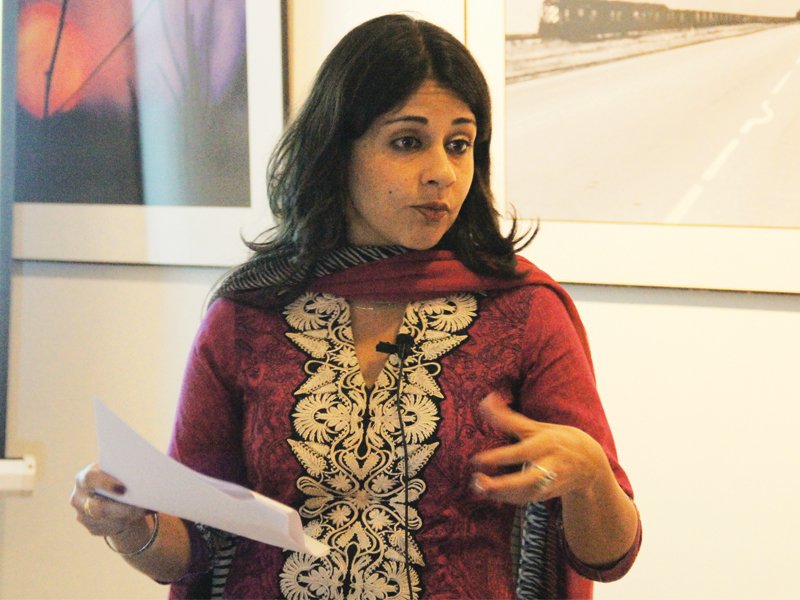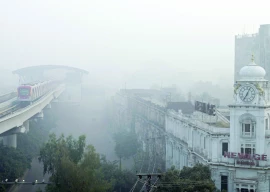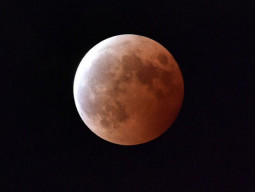
Muslims residing in a non-Muslim state like India have always talked of social identity crisis and politico-religious insecurity issues since the days of the War of Independence in 1857. Do these issues still apply? Yes they do.
Nida Kirmani, at her talk at T2F, spoke of Muslim marginalisation in the Indian urban locality of Zakir Nagar, New Delhi. She captured the essence of this locality by interpreting what Muslim women of this area shared with her.
Kirmani’s research, which she conducted about eight years ago, is now in the form of a book titled Questioning the Muslim Woman — Identity and Insecurity in an Urban Indian Locality. The book throws light on what she believes is, “extremely relevant today, keeping in mind the intrinsic issues,” but she does not in any way feel the need “to bash India, rather we should draw parallels to a country called Pakistan, where the situation is a lot worse for minorities.”
As she conducted 70 interviews within this locality, she examined the fact that Delhi is a partitioned city, where, like in other places across India, “Muslim mohallas [communities] grew and places like Zakir Nagar were termed as ‘Mini Pakistan,’ for the increasing number of Muslims residing in these areas.”
Kirmani believed that, “Mohallas were shaped by the events of the partition of 1947, and whether people chose to live together, or were forced to do, is a debate that continues unabated.”
Another statement which is yet to be determined, is whether or not Zakir Nagar can be defined ‘as an enclave or a ghetto’.
Narrating it from a Muslim woman’s perspective residing in a locality like Zakir Nagar, where the average middle-class lives, the biggest problem for Muslims is religious insecurity and a social identity crisis.
She highlighted the fact, that “the Muslim woman is known for her personal law of pardah [veil], or being burqa clad, which highlights the social issues of a Muslim woman even in today’s India, forcing the others to think that they are an oppressed class or section of society.”
“The biggest problem that remains for Muslims is insecurity. No matter how posh a locality is, the feeling that they are insecure thrives in their mind-set,” she added.
Citing examples from major episodes of religious disharmony that India succumbed to in the past, she reported on the Partition of India in 1947, The Sikh Massacre of 1984, The Babri Masjid riot of 1992-1993 and The Gujarat massacres of 2002, all of which have propelled Muslims to feel insecure in India. These hosts of past incidents have made Muslims face other things at a larger level, mostly reclining towards, “gender insecurities, the insecurity of the poor and even housing discrimination”, Kirmani added.
Despite all these issues faced by Muslims residing in India, Kirmani was hopeful, for what she witnessed was a “silent revolution taking place from within” and women asserting for their rights and even going ahead and saying out-rightly, “We are better off than our mothers were in their time!”
Published in The Express Tribune, January 13th, 2014.
Like Life & Style on Facebook, follow @ETLifeandStyle on Twitter for the latest in fashion, gossip and entertainment.
COMMENTS (55)
Comments are moderated and generally will be posted if they are on-topic and not abusive.
For more information, please see our Comments FAQ

1724238420-0/Untitled-design-(3)1724238420-0-165x106.webp)

1731678234-0/pete-(1)1731678234-0-165x106.webp)












ET: Please let this through @Roy: “Muslims who are modern in their outlook, their dress code and don’t make show of their religion do very well in India.” Doing well should only have to do with how qualified Muslims were not because they were “modern” or whether they “show of their religion.” Religious adherence does necessarily translate into “show of religion.”
@Roy: Anyone with “modern outlook, literally get the red carpet thrown for them in India’ because they are modern not necessarily because they are Muslim.
“Muslims…” who “…don’t make show of their religion do very well in India.” Well, they should do very well regardless, but only on the basis of their merit.
So you do admit that “showing of their religion” gets them to not do very well in India. Thank you.
Truth is that Muslims in Pakistan or Bangladesh are not doing any better than Muslims in India. The urge to create a ghetto amongst Indian Muslims is not the fault of the Indian constitution which is truly secular and modern in its outlook unlike the Pakistani constitution which brazenly discriminates against religious minorities. The real reason for the ghetto mentality lies with the Muslim obsession to literally wear their religion wherever they go. Muslims who are modern in their outlook, their dress code and don't make show of their religion do very well in India. Educated Muslims with a modern outlook, literally get the red carpet thrown for them in India and this is by no means an exaggerated statement.
@Sandip: They have melted in the mainstream but you shall never believe, period.
@Sandip: They have melted in the mainstream but you shall never believe, period.
@Striver: "We’ve never had large scale Gujarat type massacres.". That's because you have turned silent cleansing into an art. Can you account for the disappearance of the Hindu and Sikh population from Pakistan post-partition? Don't tell me they became so enamoured of Islam that they converted en masse.
It is good to know that Muslim women are asserting their rights (like other women from other communities). Next step is to move out of the ghettos and move into mainstream...as we do in North America or Europe. Those who choose to stay in a predominantly ethnic area take much longer to integrate into different strata of society.
@Arijit Sharma: My fault not knowing she is a US citizen. She is in a similar situation as I am. Our elders were all Indian citizens whether they were born in Delhi or Lahore and some still respect and recognize this fact. I am sure I was writing against hatred and for freedom of speech. Regards, M
@Striver: For Gujarat scale type massacres you need large number of minority people which is not possible in Pakistan because you have already killed them or forcefully convert.ed them. Gujarat roits happened 14 years back but in your country it happen everyday
Delhi of today is much different than the Delhi of yesteryears'. Does that have anything to do with the insecurity of Muslim women?
Minorities feel insure in India since though Constitutionally Bharat is secular yet the society is only slowly moving in that direction.
Dr. Kirmani is a US national who was born in US. She has family across India and Pakistan.
@Mirza: " ... The lady is not bashing India because she is a proud Indian. ... "
Dr. Nida Kirmani is Assistant Professor of Sociology at the Lahore University of Management Sciences.
Indian tails on fire, lovely.
I explained in my previous post, that India is not a "non Muslim" state, and so called "insecurity" are consequences of such misconceived notion, but my post is not published.
There is an old maxim: "When in Rome do as the Romans do". It has always smoothed the way for me. If some people wish to have a rough ride, well so be it. I cannot help them.
Coming back to the real topic, why is not possible to compare how Muslim minority women fare better or worse as compared to the women of other minorities? Bashing India or not comparison with Pakistan is an attempt to bash Pakistan.
@vasan: "But violence seems to have taken over Pakistan and muslims in general. Look at the arc between egypt to pakistan." But this has nothing to do with the violence which originates in India.
Please rethink : I agree with you 100%. But violence seems to have taken over Pakistan and muslims in general. Look at the arc between egypt to pakistan. Unless they give up violence, backlashes will be more painful and tendency to multiply.
@Mirza: We actually do allow it. There are a number of NGO's working for women rights, minority rights and education rights. We are fighting a mentality that is still a minority here in Pakistan.
@Please rethink.: Wasn't Mumbai 1993 a backlash to the destruction of the Dec.1992 Babri Mosque? The Godhra train bombing (2002) was caused by accidental fire by stoves but some commentators say it was a "staged trigger" "for what was actually premeditated violence." Please rethink!
The insecurity would diminish considerably if Muslims chose not start the violence. That is what happened in Mmbai 1993, Gujarat 2002 and Muzaffarnagar 2013. The notion that a minority has a minority has a right to start violence but here would not be any response is naive at best.
Don't start violence, don't fear backlash.
The lady is not bashing India because she is a proud Indian. If she were afraid as a minority in India she would not dare write about this subject openly with her name. Can we allow our minority women or even Muslim women openly writing against women's treatment in Pakistan? That woman would not be safe and hide in a western country. As an Indian the author has every right to express her opinion and observations without fear. We may or may not agree with her but she is free to express herself openly and fearlessly.
there was only 9% muslim Population in Indian in 1947, now it is 18%. 200% increase in 60 years. India muslim enjoys Haj subsidy from the govt at the cost of tax payers money where no other community even Hindus are eligible for this kind of privilege. Muslims are entailed for 4 marriages as per the Indian Secular constitution.
Still Muslims are not Happy here?
@Saad Zafar: First research for your own and if you survive then start for others.
@Saad Zafar: " ... Are Pakistani researchers not supposed to look into indian society? ... "
They are most welcome. But they must avoid being sanctimonious.
India should learn how to treat its minorities fron Pakistan.
Solution is very simple. Forget about Kerman and be Indian.
Questioning the Muslim Woman — Identity and Insecurity in an Urban Indian Locality
I think a muslim woman would feel better to grow in a country where muslims are in minority than where muslims are in majority
There was a muslim co-worker in my company..She used to wear salwar kameez like everyone..But then,later she started dressing in hijab..When asked she said that the local elders had complained her parents that she was dressing indecently.. Strange that a salwar kameez is considered indecent for few people and she had no other choice as her parents were given a thinly veiled threat...She started wearing hijab and then remove it when she comes to office and work in salwar kameez....
Though lot of muslims say Hijab is a personal choice..Honestly most of them who wear it out of compulsion rather than choice.....
@Rahulbabapappu: I enjoyed reading your comment, and learned something from it, since it tends to express your opinion rather than a tit for tat insulting comment as is common between Indians and Pakistanis. I do not know if both of our communities realize that these insulting comments hurled against each other betrays their lack of class and maturity. It's not that one has lost and the other has won by competing to show who can cast a more vitriolic comment against the other; it is more like a demonstration of how low one can get despite living besides each other for thousands of years and originating from the same Vedic civilization. And, this is for the information of Pakistanis: the epicenter of Vedic civilization was what you would call present day Punjab in Pakistan.
In a western country teenage girls attend Saturday school at the local Mosque. Recently a Muslim lady teacher of Pakistani origin told girls not to communicate with non Muslims and not to use electronics. This lady got earful from teenagers that only way to obtain good jobs is to build a network of people regardless of the religion. All of them had non Muslim friends and they found nothing wrong with them. They also told her that electronics (read internet) they feel connected with others in support network and use it for school work and for knowledge gathering. All these things are important to feel confident and move forward. Lesson learn is that teachers, preachers and fellow Muslim are spreading misinformation without realizing the damage they are doing to the psyche of youngster and than they talk about discrimination, suppression, inclusion of minority etc etc. By the way this lady was getting paid by the non Muslim taxpayers. Moral of the story look inwards and realize the damage these ignorant preachers are doing to the faithfuls.
There is flaw in the hypothesis of this research. The correct question is why do Desi people all over the world live in cramped neighborhood and do not improve public hygiene around there houses.
Those muslim women who are educated and have joined the mainstream are assertive and have nothing to fear. One eg would be Shazia Ilmi of the Aam Admi Party. She lost to BJPin R.K. Puram constituency ( a hindu majority area) by a few hundred votes in the recently concluded Delhi assembly elections. There are many such women. Only those muslim women who live in the past, are not educated and not aware of their rights fear that they are not safe. The truth is, Old delhi still has majority muslim population for past 50 plus years and i have not heard of any riots anywhere. The only riot that happened in Delhi (that i was a witness of) were against sikhs and were politically motivated.
Ms. Saadia: "Muslims residing in a non-Muslim state like India have always talked of social identity crisis"
What do we say about non-muslims living in a muslim state? If identity crisis was the only problem for them, they'll be so thankful!
@majid: Why forget about India or New Delhi? Are Pakistani researchers not supposed to look into indian society?
Once they got Pakistan, they should have moved there.
"a country called Pakistan"....
Yes, pick up the geography books! Pakistan exists next to 'a country called India'.
Here come the indian shills to defend the indefensible. their presence here, in this virtual world, reminds us why current Pakistan will all its problems is better off without their unwanted physical presence among us.
@majid: So that should be an excuse?. Then forget housing problems. Modi is going to rule India soon! Worry about your life first rather show pitty here
If minorities are religious based they will feel insecure any where. As the minorities grow if they are allowed to live, work & prosper they will thrive. Look at the United States of America ethnic batches from Europe & now Asian & African groups live, work & pray. There were periods of history with the Japanese internments, Mexican & Muslim bashing but other minorities spoke out to protect these groups. NO RELIGION is allowed here to dictate laws for We the People instead the diverse cultures & religions have become the cornerstone of stability & success as tolerance has become a value we all cherish!
Segregation is there i completely agree, it's a fact that one feels happy when one lives in their own society and it's opposite is also true where Hindus are not so welcomed in Muslim dominated areas such as in old city area bhopal( i have experienced it myself). But that does not mean it's always forced segregation some times it's self imposed aswell and i don't find anything wrong in it if someone chooses to live like that and it's completely ok as long as it's not contributing to any tensions between communities. Old city bhopal has a lot of Muslim population and i like to go there during eid because of it's "raunak and chahal pahal" just as i like to roam around during Hindu festivals. Bhopal is quite secular compared to say hyderabad or some other major Muslim areas of UP and for some Pakistanis it might seen ironic but BJP is ruling in MP and they have just won there with 3/4th majority and that is because here Hindus and Muslims respect each other and think about development instead of division. One more thing it's right Muslim women are stereotyped to be oppressed but most of Indians are indifferent to it because they know it's Muslim culture.
i hope it gets published @et
Why only Muslims, every caste has its own "Muhallas" in India or for that matter even in Pakistan. Its a personal choice in most of the cases. Living in a "Muhalla" of their own is far better than living in a artificially created country for some of them.
Now all the Indian commenters, are going to deny this and blame the Muslims of India for not "integrating", and then they will try to drag Pakistan into this and draw parallels, just so they can justify what they're doing.
*> she does not in any way feel the need
Why does she not feel the need to bash India? Is it because she herself as a Muslim feels insecure if she did not draw parallels with Pakistan. Why does she think the situation for minorities is far worse in Pakistan? We've never had large scale Gujarat type massacres.It is India's problem so why should she not rightly bash India? Perhaps she knows doing so would incur the wrath of the BJP/RSS-Mod terrorists. Modi will be next PM and her life could be in danger.
I feel insecurity within the Muslim women in India is the design of our fundamentalist political setup
Brace! indian reactionary trolls about to flock this article
"Insecure" means uncertain or anxious about oneself; not confident. Correct mistakes throughout the article
you need a research to know that a minority section is oppressed in india. but you don't need that kind of research in pakistan case, even satellite picture will show that. though as an indian i really don't see any discrimination but if it is there we all indians will together remove that. and hopefully you will not read or find any this kind of article in not so far future.
Some people will never be happy in life. When in minority, always whine (be in US, Europe or Asia), When they become majority, they start killing(in Middle East) each other. Still no proud of their achievements(killing) at all. What a great civilization.....
Forget about New Delhi...worry about your own Pakistanis getting killed by Taliban right and left.